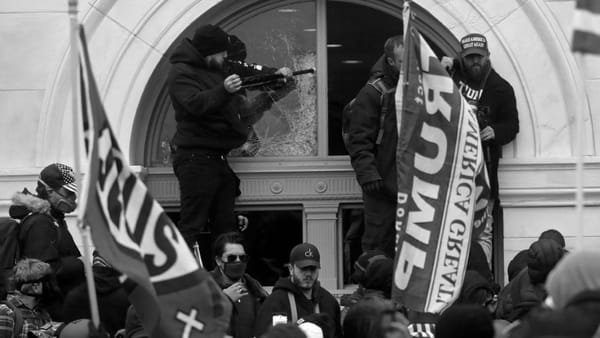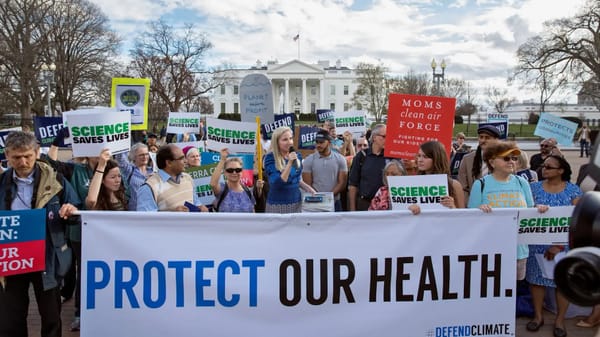America First or Globalist Betrayal? MAGA Insiders Slam Musk and Ramaswamy
The MAGA movement is built on putting America first—focusing on protecting U.S. jobs, values, and independence. But yesterday, a heated debate on X (formerly Twitter) revealed growing disagreements within the movement. Vivek Ramaswamy and Elon Musk.

By Chuck Beaton | DayMark News
The MAGA movement is built on putting America first—focusing on protecting U.S. jobs, values, and independence. But yesterday, a heated debate on X (formerly Twitter) revealed growing disagreements within the movement. Vivek Ramaswamy and Elon Musk, two high-profile figures often seen as friendly to MAGA ideals, faced sharp criticism after voicing support for expanding the H1B visa program. The clash raised a bigger question: Is the MAGA movement starting to fragment?
Adding fuel to the controversy is their dual role as co-chairs of the Department of Government Efficiency (DOGE) Taskforce, tasked with slashing billions in federal spending. Critics argue that their cost-cutting measures could align with their support for H1B visas by prioritizing cheaper foreign labor over investing in American workers. This connection has deepened suspicions among MAGA loyalists about their genuine commitment to “America First.”
The Tweets That Stirred the Pot
Vivek Ramaswamy posted a lengthy tweet blaming American culture for why companies hire more foreign workers. He argued it’s not about a lack of talent in the U.S. but that American families often value mediocrity over excellence. For example, he pointed to 90s TV shows like Saved by the Bell and Boy Meets World, saying they promoted the “normal” over the exceptional. According to Ramaswamy, immigrant families take the opposite approach, pushing their kids to excel in fields like engineering.
The reason top tech companies often hire foreign-born & first-generation engineers over “native” Americans isn’t because of an innate American IQ deficit (a lazy & wrong explanation). A key part of it comes down to the c-word: culture. Tough questions demand tough answers & if…
— Vivek Ramaswamy (@VivekGRamaswamy) December 26, 2024
Elon Musk jumped into the conversation with a sports analogy. He compared H1B workers to star athletes like Nikola Jokic in the NBA, saying America needs to recruit the best global talent to stay competitive. Musk argued that hiring top-tier foreign engineers is like adding star players to a team—the goal is to make everyone better.
Maybe this is a helpful clarification: I am referring to bringing in via legal immigration the top ~0.1% of engineering talent as being essential for America to keep winning.
— Elon Musk (@elonmusk) December 26, 2024
This is like bringing in the Jokic’s or Wemby’s of the world to help your whole team (which is mostly… https://t.co/mtd0cgkNvE
However, this analogy falls flat when considering the numbers. While NBA stars command multi-million-dollar salaries, the average H1B visa holder earns about $70,000 annually. This disparity raises questions about Musk’s framing: Are these workers the elite players Musk describes, or are they just highly skilled professionals willing to work for less than their American counterparts?
Well I guess I won. @elonmusk
— Laura Loomer (@LauraLoomer) December 26, 2024
Because I got you and all of your Big Tech buddies who are trying to infiltrate the White House to respond and expose yourselves as being in opposition to MAGA immigration policy.
Thank you for telling the whole world that everyone who speaks out… https://t.co/89hM4AFO7Y pic.twitter.com/tbAEtukIZM
Their comments sparked an intense backlash. Conservative activist Laura Loomer, a vocal MAGA insider, blasted their views as a betrayal of MAGA principles. “The real President knows H1B visas are bad for America,” she tweeted, referring to Donald Trump. Loomer accused Musk of retaliating by removing her X verification badge and canceling her premium account features after she criticized him.
I mean right after @elonmusk called me a troll today, my account verification was taken away, my subscriptions were deactivated and I was banned from being able to buy premium even though I was already paying for premium.
— Laura Loomer (@LauraLoomer) December 27, 2024
Clearly retaliation. https://t.co/fVskKH9Trg
A Movement Divided?
At the heart of this debate is a core MAGA principle: protecting American workers. Trump’s 2016 campaign heavily criticized immigration programs like H1B visas, which many MAGA supporters believe take jobs away from Americans. Ramaswamy and Musk’s defense of the program runs counter to this belief.
Ramaswamy’s argument shifted blame from corporations to families, implying that regular Americans aren’t pushing their kids to achieve greatness. For many MAGA loyalists, this is a tone-deaf take, especially since the movement often highlights systemic issues like outsourcing and corporate greed as the root of economic struggles.
Musk’s sports analogy, while intended to simplify his point, alienates MAGA supporters. For those concerned about wage suppression, the $70,000 average salary of H1B workers doesn’t align with Musk’s narrative of top-tier talent. Instead, it reinforces the view that companies use H1B visas to save money rather than invest in American workers.
Nobody can afford to live off of $70,000 a year in today’s America.
— Laura Loomer (@LauraLoomer) December 26, 2024
Stop crying about declining birth rates when you want us to live like a bunch of welfare queens.
Can’t have a family and keep having more kids while making $70,000 a year and also working 80 hours a week.… pic.twitter.com/l11g1KEMql
Their work on the DOGE Taskforce adds another layer to the criticism. By leading efforts to cut billions in federal spending, some perceive Ramaswamy and Musk as favoring corporate interests over MAGA’s populist base. For MAGA insiders, this raises doubts about whether the two truly align with the movement’s priorities.
Signs of a Fractured Movement?
This debate isn’t just about visas or jobs—it’s a sign of deeper divisions within MAGA. Over the years, the movement has grown beyond its original base, attracting many voices, from traditional conservatives to tech billionaires. But this diversity is now becoming a source of tension.
The clash over H1B visas highlights a key fault line: populist nationalism versus globalist pragmatism. For some, like Loomer, “America First” means prioritizing American workers, even if it means rejecting global competition. For others, like Ramaswamy and Musk, “America First” is about ensuring the U.S. stays ahead by any means necessary, even if that includes hiring top foreign talent.
This ideological split raises questions about the movement’s future. Can MAGA remain a united force, or will debates like this lead to further fragmentation? The backlash against Ramaswamy and Musk suggests that some MAGA loyalists are unwilling to compromise on foundational issues like immigration and jobs.
What’s Next for MAGA?
Ramaswamy called this a “wake-up call” for America, urging the country to focus on excellence. However, the backlash shows that not everyone agrees on achieving that goal. As MAGA wrestles with these internal disagreements, its identity as a movement is being tested. Will it continue to stand for populist values, or will it embrace a more globalist approach to stay competitive?
One thing is clear: these debates aren’t going away. As MAGA grows, so do the challenges of keeping it unified. The movement’s future will depend on how it navigates these internal struggles and whether it can adapt without losing its core identity.
Final Thought:
Is this debate over H1B visas just a bump in the road, or does it signal deeper cracks in the MAGA movement? As the 2024 election approaches, these questions will likely shape the next chapter of America’s political landscape.
This article is licensed under Creative Commons (CC BY-NC-ND 4.0), and you are free to share and republish under the terms of the license.
At DayMark News, we are committed to exposing the rise of authoritarianism and its threat to democracy. In a time when disinformation spreads like wildfire and democratic institutions face relentless attacks, we need your support to keep the fight alive.
Investigative journalism is our weapon against authoritarian ideologies. We delve deep to uncover the truths others would rather keep hidden, while providing actionable resources to empower individuals like you to defend our democracy.
We believe in transparency, integrity, and the power of a well-informed public. But maintaining a platform dedicated to fearless reporting and mobilization requires resources. We refuse to bow to corporate interests or compromise our mission. That's why we turn to you — our community.
Every donation, big or small, helps us continue our work. With your support, we can produce the in-depth analyses, breaking news, and educational tools needed to resist the rise of extremist movements and protect democratic values for future generations.
This fight belongs to all of us. Together, we can ensure that democracy not only survives but thrives. Please consider making a contribution today to keep DayMark News strong and independent.
Donate Now: Because Democracy Can't Defend Itself.

 Donate
Donate



